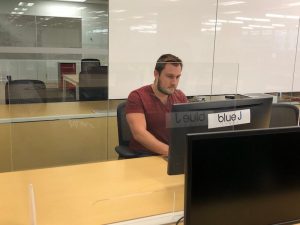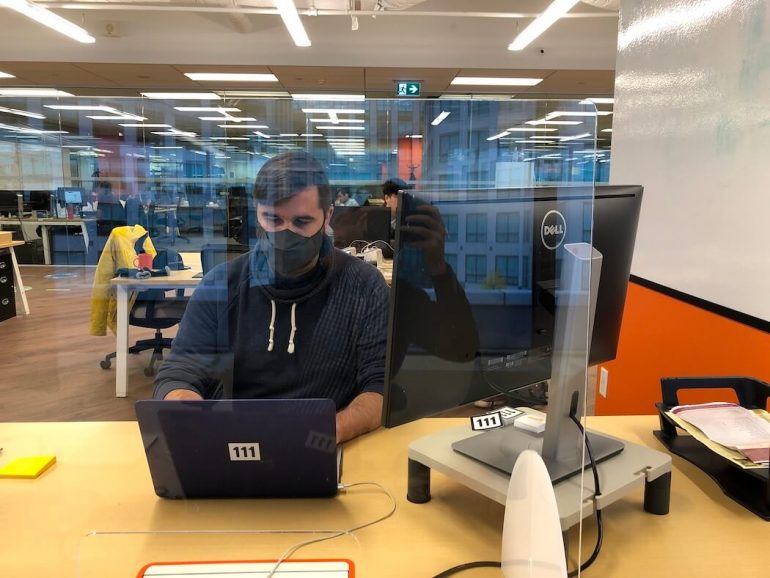With new leadership and familiar advisors, Toronto innovation hub OneEleven has re-launched.
Shuttered following the onset of COVID-19, the tech incubator and co-working space made its return to the Toronto tech ecosystem earlier this month at the beginning of the pandemic’s second wave.
“OneEleven had a real meaning and people cared about OneEleven.”
Now under the helm of the Ontario Centres of Excellence (OCE), the new OneEleven also has a new managing director, GroceryHero co-founder Matthew Lombardi. The hub has also relaunched with the support of a new advisory council, set to help inform the rebuild of OneEleven and provide mentorship for member companies.
BetaKit spoke with Lombardi, about his plans for the reboot, the new advisory council, and how startups are responding to the re-launch of a much-loved component of Toronto’s tech ecosystem.
The nine-person council is comprised of tech sector notables including Real Ventures’ Janet Bannister, Microsoft for Startups’ Adam Nanjee, and head of global real estate investments at TD Asset Management, Colin Lynch, among others.
OCE, a founding member of the original OneEleven alongside Ryerson University and OMERS, holds two seats on the council: president and CEO Claudia Krywiak and vice-chair Bob Richardson. Ryerson University president Mohamed Lachemi is also on the council.
Former OMERS Ventures CEO John Ruffolo is also set to serve as an honourary chair on the committee. Ruffolo was instrumental to the founding of the original OneEleven, and sat on the organization’s board during his time at OMERS Ventures.
RELATED: OneEleven to return under OCE control in next few weeks
“I think the group of people speaks for itself in terms of how much support there is and how much excitement there is across the city for OneEleven’s reboot,” Lombardi said in regards to the council.
The re-launch of OneEleven follows a tumultuous year for the incubator, which saw its board of directors suddenly shutter the organization in April, citing COVID-19. Public outcry over the decision and its handling led to a push from its tenants and members of the Toronto tech ecosystem to launch a salvage operation, with the IP and naming rights transferred to OCE in August.
Speaking with BetaKit, Bannister stated that the push from OneEleven community members to save the incubator truly showed the importance of its role in the Toronto tech ecosystem.
“OneEleven had a real meaning and people cared about OneEleven,” said the new advisory council member. “And the founders from when OneEleven was built, they cared enough to say, ‘hey, we’re gonna fight for this.’”
For those familiar with the organization, the new OneEleven will likely look similar to its previous iteration, but on a smaller and more virtual scale.
Lombardi noted that OneEleven is set to maintain its core programming, though with a digital focus over in-person event functions.
“We are continuing to be focused on really high potential post-seed companies,” Lombardi told BetaKit, noting that the hope is for OneEleven to continue being a home for serial entrepreneurs.
“It’s a lot of what I call safety Tetris.”
– Matthew Lombardi, OneEleven
“We expect OneEleven to be bringing the same value,” he added. “As far as it being a hub of activity, the number one place that post-seed companies want to go to help grow their company, that value proposition remains the same, because that’s what we’re hearing from the members and the alumni who’ve reached out to give us advice on how we reboot.”
OneEleven remains at 325 Front Street (also the location of OCE’s headquarters), now comprising one floor instead of its previous two. The ongoing COVID-19 pandemic has further limited the hub’s capacity. Lombardi noted they have “de-densified” the space as part of a broader COVID-19 safety plan. The plan includes enhanced cleaning, physical distancing, masks, and an updated air filtration system.
With a smaller space retrofitted to allow for social distancing, OneEleven is set to house fewer companies than before – at its peak, the incubator hosted 55 companies and over 1,100 people.
“It’s a lot of what I call safety Tetris,” Lombardi told BetaKit, noting that because of its COVID safety plan OneEleven can currently only accommodate two-thirds its total capacity. While Lombardi did not provide details on what full capacity looks like, one source familiar with the space pointed to the potential for 600 seats in non-COVID times.

The new OneEleven has also reverted back to the incubator’s original organization model. The organization was founded as a non-profit in 2013 before being incorporated as a for-profit entity in July 2018 by Oxford and OMERS; a decision made in part to support the organization’s international expansion plans that ultimately did not pan out.
Lombardi noted that under the original not-for-profit model, OneEleven “functioned very successfully for five years.”
“We’re operating on a breakeven basis,” he said. “And that means membership fees plus corporate partnerships is how we get to breakeven. Lombardi added that OneEleven is looking to re-engage previous corporate and ecosystem partners.
Sources with intimate knowledge of the organization’s return have previously indicated to BetaKit that OneEleven is keen to seek financial support from government, including federal (likely via FedDev) and the City of Toronto. OneEleven’s parent org, OCE, has previously received FedDev funding.
While Lombardi pushed away questions from BetaKit as to whether OneEleven is actively pursuing such funding, he noted that the incubator will “look at any opportunity that comes up” and is “happy to have support anywhere that it might come from.”
At the very least, OneEleven has received public forms of support from both the municipal and provincial levels, with Toronto Mayor Tory and Ontario’s Minister of Economic Development, Vic Fedeli, both expressing excitement about the incubator’s return in an October 1 launch video.
Happy to see that @oneeleven_111 is back and ready to help our technology and innovation sector. There is no better time than right now as we work together to come back stronger! https://t.co/meZoJPaR7p
— John Tory (@JohnTory) October 7, 2020
Excitement for OneEleven’s return amongst Toronto-based startups is more complicated matter to parse.
Lombardi told BetaKit that 13 prior OneEleven tenants have already re-signed, with approximately 35 to 40 people inside the hub each day since its re-launch. For now, the organization is still working through ‘first-right-of-refusals’ from previous tenants before moving onto outbound recruitment efforts. Despite no active recruitment efforts to date, Lombardi stated that, as of October 24, eight new companies have reached out expressing interest.
“We’re not waiting for COVID to sort of sort itself out, we’re adjusting and adapting like everyone else,” the managing director said. “We’re able to rebuild in spite of all the things that are going on in folks’ lives [and] folks are telling us that this is a valuable community and they want us to press ahead. So, we’re excited to do that.”
“Everybody came together because they believe that it was worth saving, pandemic or no pandemic.”
Former OneEleven startups BetaKit previously spoke with indicated hesitation, however, to return to the incubator due to concerns directly linked to COVID-19. Namely, a lack of interest from employees to return to shared office spaces during a pandemic.
Lombardi stated that OneEleven respects those safety concerns, and emphasized that the hub’s COVID-19 safety plan was created with support and input from its community members. He also noted that a number of other startups have expressed interest in returning to an office space, and OneEleven expects more previous tenants to return in addition to the current 13.
To expand OneEleven’s reach beyond its walls, Lombardi is also planning to create a digital membership and make programming available virtually.
“The peer groups, the skills-building workshops, the internal mentorship program, or quarterly investor showcases, all of that is the bread and butter of OneEleven,” he said. “And we’re working to rebuild that [in a] hybrid in-person, digital fashion.”
RELATED: MaRS in talks with University of Calgary to bring new innovation hub to Alberta
He noted that OneEleven is also planning to roll out the digital membership. Lombardi did not provide details on pricing for the digital membership, stating that OneEleven plans to roll out a plan later this year.
Notably, OneEleven’s current membership pricing remains the same as it was prior to the shutdown, creating another potential hurdle for Toronto startups already weighing employee reluctance and space restrictions due to COVID-19. Lombardi told BetaKit that the decision to maintain pricing was made to ensure the Toronto incubator could operate sustainably.
With the physical limitations presented by COVID-19 and plans to augment programming for a new virtual world, Lombardi sees potential for OneEleven to set an example on how to build a hybrid community during a pandemic.
“Everybody came together because they believe that it was worth saving, pandemic or no pandemic,” he said. “Everyone’s pretty excited about that, and the pandemic’s just one more challenge.”
“[We are] just at the beginning of a really cool opportunity that I think everyone in the Toronto ecosystem knows is special,” Lombardi added.
Feature image courtesy Matthew Lombardi, OneEleven


